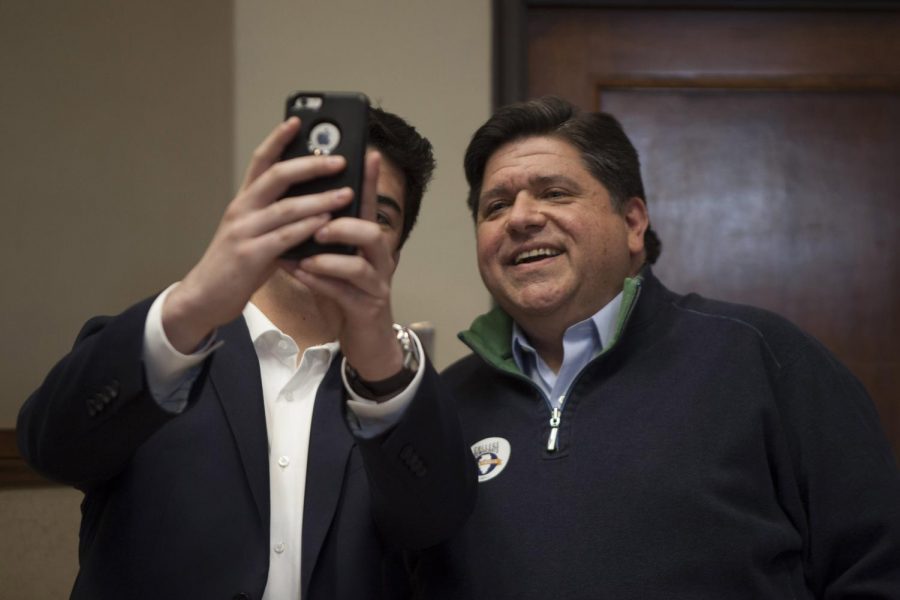Republican Gov. Bruce Rauner concedes to Democrat J.B. Pritzker in Illinois governor race
JB Pritzker takes a selfie during a College Democrats conference at the University of Illinois, April 21, 2018. (Isabel Miller | @IsabelMillerDE)
November 6, 2018
Republican Gov. Bruce Rauner has conceded his re-election bid to billionaire Democrat J.B. Pritzker, the Hyatt hotel heir’s victory likely putting his party in near total control of state government by limiting the governor to a single term.
Rauner started his concession speech less than an hour after polls closed, saying “this is a time for us to come together. This is a time for us to unite.” The governor called Pritzker before speaking to the crowd at his campaign party and promised a smooth transition, Rauner’s campaign said.
“To Mr. Pritzker, I said, Godspeed,” Rauner said. “I hope and pray you serve Illinois well.”
Advertisement
His call for unity followed a bitter race in which the two candidates broke national campaign spending records by tapping their personal fortunes for hundreds of millions of dollars.
Pritzker pumped $171.5 million into his campaign fund over the course of two years. The money paid for a nonstop stream of advertising on TV and the internet to both attack Rauner and get Pritzker’s name in front of voters in a state where he’s never held elected office. And some of it went to other Democratic campaigns and causes, building the party with his personal wealth just like Rauner did for Illinois Republicans.
After self-funding his 2014 governor bid, Rauner put $50 million into his re-election campaign in December 2016 but hasn’t added money since. He struggled to unite Republican voters after his signature on laws to expand abortion, gay and immigrant rights angered conservatives and led to a primary bid he nearly lost.
Pritzker will control a massive state government with $7.5 billion in unpaid bills and will have to navigate a likely Democratic legislature to get his agenda moved.
Rauner supporters began gathering at his election night party at The Drake hotel shortly after 6 p.m., an event held in a noticeably smaller room than the governor used previously.
The stage at the front of the room was backed by a large American flag, and two TVs near the stage were mostly being ignored as CNN began collecting national results.
Early in the evening, U.S. Sen. Dick Durbin made the rounds at the Pritzker party, confidently predicting a win for the Democrat. He noted the Champagne glasses already in the ballroom at the Marriott Marquis in South Loop.
Advertisement*
Durbin praised Pritzker for efforts to stir support outside the Chicago area and said he believed the strategy should lead to victory.
“Pritzker did something different in this campaign,” he said. “Here was a Chicagoan, clearly a Chicagoan, who wasted no time getting Downstate. I looked around and thought, ‘This is what I’ve been looking for — a governor who starts off by unifying the whole state.'”
Pritzker has proposed overhauling the state’s tax structure but can’t do so unless voters approve the plan two years from now, and he frequently has rebuffed requests for specifics about how it would work. He favors legalizing sports betting and the recreational use of marijuana.
At a final-week campaign stop in DuPage County, Rauner outlined what he’d do with a second term, listing the first-term priorities he wasn’t able to accomplish such as imposing term limits on elected officials.
Rauner focused the final weeks of his campaign on a confidential report from Cook County’s top watchdog that Pritzker improperly received $330,000 in property tax breaks on one of his Gold Coast mansions as part of a “scheme to defraud” taxpayers.
Pritzker paid the money back, and also had to contend with racial controversies that arose inside his massive campaign organization. Three weeks before Election Day, several Pritzker staffers filed a federal lawsuit alleging racial discrimination in their months on the job, accusations he called “just not true.”
Weeks later, two of his campaign workers were fired over a video displayed on social media showing one of them wearing a dark facial cosmetic mask resembling blackface.
Both episodes stood to remind voters about an earlier storyline from Pritzker’s primary campaign, when he embarked on an apology tour after the Chicago Tribune released a secretly recorded federal government wiretap that was part of the corruption investigation of then-Gov. Rod Blagojevich, who is now in prison. The wiretap involved a replacement for then-President-elect Barack Obama for his U.S. Senate seat.
During the conversation, Pritzker pitched Illinois Secretary of State Jesse White as a replacement for Obama. White, Pritzker said, would take care of the “African-American thing” and would be the “least offensive” of the potential black candidates Blagojevich was considering. Pritzker also called former state Senate President Emil Jones “crass” and former U.S. Rep. Jesse Jackson Jr. “a nightmare.”
Rauner tried to capitalize on the late-campaign controversies over the property tax breaks, federal lawsuit and the two fired staffers, telling rally crowds and debate audiences that Pritzker was “using the language of racists.”
The Republican governor, though, had his own political currents to swim against. His four-year term was dominated by a historic war over the state budget that left social services hurting, universities without state money and uncertainty reigning over the Illinois Capitol.
The impasse put the governor at odds with his chief political nemesis, Democratic House Speaker Michael Madigan, the longtime Southwest Side party leader whom Rauner spent most of his first campaign and term in office vilifying.
Rauner tried to push Democrats to accept some of his pro-business and government reform ideas before he’d sign off on their spending plans. But after a two-year impasse, a handful of Republican lawmakers broke with Rauner, overriding his veto of an income tax hike and spending plan that broke the stalemate.
Soon afterward, the governor declared victory when signing legislation to overhaul how the state pays for public schools, but it came at a steep political cost. He got almost none of what he had hoped to get out of the deal.
And with weeks to go before Election Day, Attorney General Lisa Madigan announced a criminal and civil probe into the Rauner administration’s response to an outbreak of Legionnaires’ disease at a Downstate veterans home that left more than a dozen veterans dead over several years.
The outgoing Democratic attorney general’s move put Rauner back on the defensive weeks before a debate in Quincy on an issue that dogged his administration for more than a year.
The joy of Tuesday night may be met with the perhaps painful reality of being in control of Illinois state government in January. As of Election Day, the state faces $7 billion in unpaid bills despite last year’s income tax hike. Pension costs are going up and will suck up state money lawmakers and the governor will want to spend on other things such as education.
______
(c)2018 the Chicago Tribune Visit the Chicago Tribune at www.chicagotribune.com Distributed by Tribune Content Agency, LLC.
Advertisement









